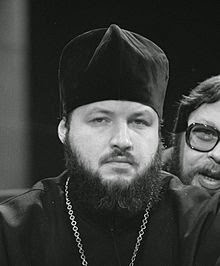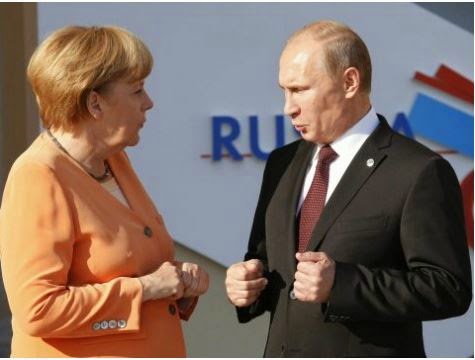"Ukraine's parliamentary elections potentially could completely transform the country's political landscape. The question is, in what way.
Already this is shaping up to be the most pro-Western legislature in the country's post-independence history. Former heavy hitters, like former President Viktor Yanukovych's Party of Regions and the Communist Party, have been sidelined."
And now the deceptive political mask that Putin has worn since the beginning of the Ukrainian crisis has finally slipped from his face. The predicted theft by Putin of the 'rebel' controlled area in eastern Ukraine will soon become a reality.
Already the Kremlin is putting in place exactly what it did in Crimea. Legitimise the criminal proxies of Putin in the rebel controlled areas of eastern Ukraine, and then absorb those areas into Russia.
As that dyed-in-the-wool Soviet Foreign Minister Lavrov has said,
" ..... [the] elections [to be held in the rebel controlled areas on 2nd November 2014] in the Donetsk and Luhansk regions "will be important to legitimise the authorities there".
And what is the EU doing whilst Putin gives the illusion that he is tearing up his own Minsk Agreement? Poland is biting the bullet. As Adam Easton writes from Warsaw,
"There has been a significant shift in the Polish military's strategic thinking in recent months, illustrated in the new National Security Strategy approved last week by the government.
For the first time in more than 20 years it admits that Poland is threatened by war and names Russia as an aggressor in Ukraine. (my emphasis)
Poles are genuinely concerned about the threat of war breaking out. However, the reinforcement of several garrisons in eastern Poland is less significant"
Yet, as Andrei Sannikov points out,
"It looks as if Europe is about to declare its favourite postulate: “Russia is by far more important for us than any other former Soviet country.” That was always the case before the war in Ukraine broke out. Europe does not want to be disturbed. It doesn’t want to see the dangers to itself beyond Russia’s war in Ukraine. It wants to go back to “business as usual” with Russia as soon as possible. The war is a nuisance. Dead bodies of Ukrainian patriots are a nuisance.
 |
| Andrei Sannikov |
For the EU the stakes are getting higher and higher. Even Angela Merkel is finally becoming aware that,
" ... Russia’s actions against Ukraine potentially threaten the “European peace order.” Policy debates in Germany reflect, belatedly and still tentatively, this assessment...."
As Vladimir Socor says, "Merkel is becoming increasingly (and uncharacteristically) critical of Moscow’s actions against Ukraine, and concerned about the implications beyond Ukraine."
Yet she cannot quite distance herself from Putin's Minsk Agreement.
"Merkel (and any government in this situation) has no choice but to turn to the same Moscow in attempting to salvage the armistice agreements. In standing up for observance of the armistice agreements, Merkel is implicitly and explicitly acting in Ukraine’s interest at this time." (Vladimir Socor)
But is she really acting in Ukraine's interest at this time? Or is she simply wishing that the Ukraine crisis can go away, and that the German economy can reinstate its exports to Russia.
"German exports to Russia dropped by more than a quarter in August over
the same month a year ago as sanctions over Ukraine took an increasing
toll. The Federal Statistical Office said Wednesday that German exports to
Russia dropped 26.3 percent in August to 2.3 billion euros ($2.93
billion).
Over the first eight months of 2014, exports to Russia fell 16.6 percent
to 20.3 billion euros, led by a 22.6 percent drop in machinery
deliveries. Russia was Germany's 11th biggest market in 2013 but slid to 13th in the first eight months of 2014."
But perhaps most frightening of all is the fact that in 2 days time Federica Mogherini will take on the mantle of the EU's new Foreign Policy Chief. That she is soft on Russia is a well known fact.
"Many EU leaders failed to agree on her candidacy. The Baltic states and Poland saw her as inexperienced and too soft on Russia. Mogherini has also only been Italy's foreign minister since February (2014)." (Daniela Vincenti)
Thus, "[w]hile there is broad support for maintaining the sanctions within the EU, a number of senior politicians, including incoming EU foreign policy chief Federica Mogherini, have questioned whether the measures are affecting Russian President Vladimir Putin's decisions toward Ukraine." (Laurence Norman 29 October 2014)
 |
| Putin and the 'fragrant' Mogherini in Moscow July 2014 |
9. Ensure early local elections in accordance with the law of Ukraine "about local government provisional arrangements in some areas of Donetsk and Luhansk Oblasts" (law on the special status)
The EU and the US will argue that the elections to be held in the rebel areas on 2nd November 2014 will not be 'in accordance with the law of Ukraine' and, indeed, this will be the case. But, in reality, this is a diplomatic coup for Putin. "Ukraine’s [and the EU's and America's] current predicament is a familiar one to Georgia and Moldova: these countries were forced into a Russian-dictated armistice agreements, which then became their only recourse against Russian abuses of the agreed terms." (Vladimir Socor )
As Andrei Sannikov says, "It looks as if Europe is about to declare its favourite postulate: “Russia is by far more important for us than any other former Soviet country.” That was always the case before the war in Ukraine broke out. Europe does not want to be disturbed. It doesn’t want to see the dangers to itself beyond Russia’s war in Ukraine. It wants to go back to “business as usual” with Russia as soon as possible. The war is a nuisance. Dead bodies of Ukrainian patriots are a nuisance." (my emphasis)
(to be continued)



































